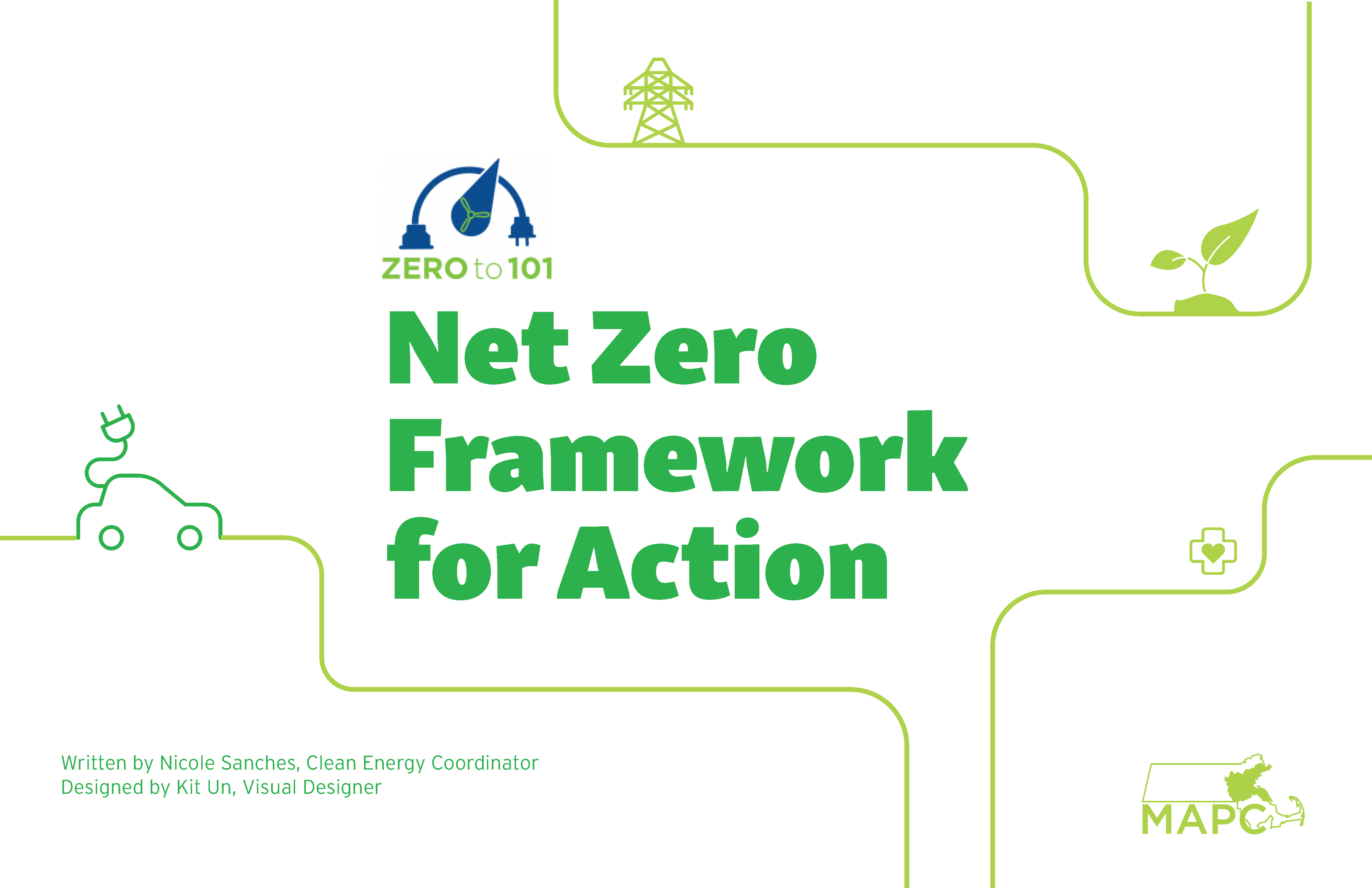
Zero to 101
Net Zero Planning
Introduction
Net Zero goal-setting, planning, and implementation is a way to advance a community’s carbon mitigation efforts. Net Zero planning offers each city or town the framework to form a scope of work and definition of Net Zero that meets its community goals and targets while taking tangible steps toward the need to keep global temperatures from rising above 1.5 degrees Celsius, as institutionalized within the Paris Climate Agreement. A community may determine, for instance, that it will next focus its net zero planning efforts on its largest source of emissions, such as building energy; on leading by example in the municipal sector as a starting point; or on going all-in with a community-wide net zero GHG emissions approach.
Many cities and towns in the MAPC region are already taking action reduce their community's greenhouse gas emissions by creating local energy action plans, becoming designated as Green Communities by the Massachusetts Department of Energy Resources, and investing in renewable energy. These efforts are the foundation of a net zero framework for holistic climate planning that can enable municipalities to address not just energy use, but also optimize benefits to the environment, public health, economy, and more. A net zero plan can provide an overarching framework that serves to harmonize and grow all of the sustainability efforts underway in a community.
Look at our “What is Net Zero?” page for examples of Net Zero terms and definitions to get started, and check out the pages on process and examples to think through next steps. This site should serve as a suite of resources: an online toolbox of how-to guidance documents, case studies, templates, and more to help communities develop a Net Zero target and build a holistic plan to get there.
Check out our Municipal Net Zero Playbook for information on the best practices and actions municipalities can implement in their plans to advance toward Net Zero.
Questions?
For more information about Net Zero Planning, contact Megan Aki, Clean Energy & Climate Systems Manager.

New Release: Municipal Net Zero Playbook
The best practices and actions municipalities can implement in their plans to advance toward Net Zero. Read the Playbook.
Register Today!
Join MAPC for the virtual launch of our Municipal Net Zero Playbook on Monday, November 22, from 11 a.m. to 12:30 p.m. Click here to register.
Take Action:
Participate in Our Zero to 101 Series
Zero to 101 is a series of events and webinars on Net Zero Planning. Check out the first webinar here to get started. Materials and resources from our October 11th forum are posted in our 2017 Clean Energy Forum page. Stay tuned for upcoming Zero to 101 events.
LEARN MORE:
Local GHG Inventories and Plans
During 2019 and 2020, MAPC worked with Arlington, Melrose, and Natick to develop or update their community-wide greenhouse gas inventories and to draft a net zero plan for each community. MAPC is also developing and launching shared net zero resources for communities in Massachusetts. Check out our ongoing net zero planning work here.
Explore:
Net Zero Community Case Studies
Among many communities, Cambridge, Boston, and Vancouver have each developed a Net Zero commitment and plans to achieve their goals. Explore these plans on our Net Zero Community Case Studies page to see a range of approaches to achieving Net Zero in a community.
The Urgency of Now
In order to avoid the most damaging effects of climate change, GHG emissions must be addressed rapidly and comprehensively. While climate change will lead to long-term consequences, the effects are being experienced now. Average temperatures have risen by almost two degrees Fahrenheit in the last century in the Northeastern United States with a potential increase of ten degrees in the next century.[1] The Northeast region has also experienced a 70% increase in the amount of precipitation fallen on days with heaviest precipitation pointing to an increase in intensity.[2] In Boston, sea levels are expected to rise eight inches relative to land by 2030, 1.5 feet higher by 2050, and three feet higher by 2070.[3] The time to act – and the time for cities and towns to lead – is now.
The Paris Agreement in 2015 marked a turning point for global climate action with 159 parties[4] ratifying the agreement to limit warming to well below 2 degrees Celsius above pre-industrial levels and ideally to 1.5 degrees Celsius.[5] While President Trump has decided to pull the United States from the Agreement, cities and towns across the U.S. have risen to the occasion by reaffirming their commitment to fight climate change. 365 “Climate Mayors” representing 67 million Americans had committed to uphold the Paris Agreement through August 2017.[6] 9 Massachusetts cities and towns have signed the “We are Still In” declaration, showing a commitment to upholding the Paris Agreement.[7] The 14 communities of the Metropolitan Mayors Coalition have pledged to be Net Zero by 2050.[8]
MAPC is uniquely positioned to provide guidance throughout a municipality’s journey to act on climate change. Net zero planning provides a way for cities and towns in our region to lead in the battle against climate change by reducing GHG emissions in a holistic, systematic, and comprehensive manner. MAPC seeks to provide technical assistance to those undertaking this important action.

[1] “Climate Ready Boston: Climate Projections Consensus” Boston Research Advisory Group. (2016)
[2] Ibid.
[3] Ibid.
[4] “Paris Agreement: Status of Ratification.” United Nations Framework Convention on Climate Change. (2017) https://unfccc.int/paris_agreement/items/9444.php
[5] “The Paris Agreement.” United Nations Framework Convention on Climate Change. (2017) https://unfccc.int/paris_agreement/items/9485.php
[6] “Cities Adopt the Paris Climate Agreement Goals.” Climate Mayors. (2017) https://climatemayors.org/
[7] “We Are Still In Declaration” The American Sustainable Business Council, et.al. (2017) https://www.wearestillin.com/
[8] “Metropolitan Mayors Climate Mitigation Commitment” Metro Mayors Coalition (2016) https://www.mapc.org/our-work/expertise/climate/mmc/

